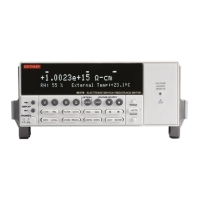Model 6517B Electrometer Reference Manual Appendix D: IEEE-488 bus overview
6517B-901-01 Rev. C / August 2015 D-7
Uniline commands
ATN, IFC, and REN are asserted only by the controller. SRQ is asserted by an external device. EOI
may be asserted either by the controller or other devices, depending on the direction of data transfer.
The following is a description of each command. Each command is sent by setting the corresponding
bus line true.
REN (remote enable): REN is sent to set up instruments on the bus for remote operation. When REN is
true, devices are removed from the local mode. Depending on device configuration, all front panel
controls except the LOCAL button (if the device is so equipped) may be locked out when REN is true.
Generally, REN should be sent before attempting to program instruments over the bus.
EOI (end or identify): EOI is used to positively identify the last byte in a multi-byte transfer sequence,
allowing data words of various lengths to be transmitted easily.
IFC (interface clear): IFC is used to clear the interface and return all devices to the talker and listener
idle states.
ATN (attention): The controller sends ATN while transmitting addresses or multiline commands.
SRQ (service request): SRQ is asserted by a device when it requires service from a controller.
Universal multiline commands
Universal commands are those multiline commands that require no addressing. All devices equipped
to implement such commands do so simultaneously when the commands are transmitted. All multiline
commands are transmitted with ATN true.
LLO (local lockout): LLO is sent to the instrument to lock out the LOCAL key and all the instruments’
front panel controls.
DCL (device clear): DCL is used to return instruments to a default state. Usually, instruments return to
their power-up conditions.
SPE (serial poll enable): SPE is the first step in the serial polling sequence which is used to determine
which device has requested service.
SPD (serial poll disable): SPD is used by the controller to remove all devices on the bus from the serial
poll mode and is generally the last command in the serial polling sequence.

